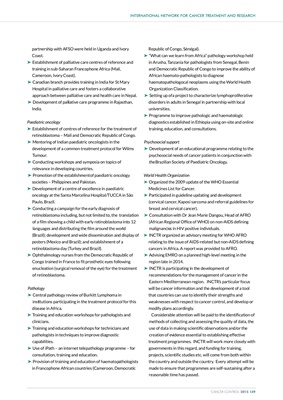
INTERNATIONAL NETWORK FOR CANCER TREATMENT AND RESEARCH
CANCER CONTROL 2015 149
partnership with AFSO were held in Uganda and Ivory
Coast.
‰ Establishment of palliative care centres of reference and
training in sub-Saharan Francophone Africa (Mali,
Cameroon, Ivory Coast).
‰ Canadian branch provides training in India for St Mary
Hospital in palliative care and fosters a collaborative
approach between palliative care and health care in Nepal.
‰ Development of palliative care programme in Rajasthan,
India.
Paediatric oncology
‰ Establishment of centres of reference for the treatment of
retinoblastoma - Mali and Democratic Republic of Congo.
‰ Mentoring of Indian paediatric oncologists in the
development of a common treatment protocol for Wilms
Tumour.
‰ Conducting workshops and symposia on topics of
relevance in developing countries.
‰ Promotion of the establishment of paediatric oncology
societies - Philippines and Pakistan.
‰ Development of a centre of excellence in paediatric
oncology at the Santa Marcelina Hospital/TUCCA in São
Paulo, Brazil.
‰ Conducting a campaign for the early diagnosis of
retinoblastoma including, but not limited to, the translation
of a film showing a child with early retinoblastoma into 12
languages and distributing the film around the world
(Brazil); development and wide dissemination and display of
posters (Mexico and Brazil); and establishment of a
retinoblastoma day (Turkey and Brazil).
‰ Ophthalmology nurses from the Democratic Republic of
Congo trained in France to fit prosthetic eyes following
enucleation (surgical removal of the eye) for the treatment
of retinoblastoma.
Pathology
‰ Central pathology review of Burkitt Lymphoma in
institutions participating in the treatment protocol for this
disease in Africa.
‰ Training and education workshops for pathologists and
clinicians.
‰ Training and education workshops for technicians and
pathologists in techniques to improve diagnostic
capabilities.
‰ Use of iPath - an internet telepathology programme - for
consultation, training and education.
‰ Provision of training and education of haematopathologists
in Francophone African countries (Cameroon, Democratic
Republic of Congo, Sénégal).
‰ "What can we learn from Africa" pathology workshop held
in Arusha, Tanzania for pathologists from Senegal, Benin
and Democratic Republic of Congo to improve the ability of
African haemato-pathologists to diagnose
haematopathologocal neoplasms using the World Health
Organization Classification.
‰ Setting up of a project to characterize lymphoproliferative
disorders in adults in Senegal in partnership with local
universities.
‰ Programme to improve pathologic and haematologic
diagnostics established in Ethiopia using on-site and online
training, education, and consultations.
Psychosocial support
‰ Development of an educational programme relating to the
psychosocial needs of cancer patients in conjunction with
the Brazilian Society of Paediatric Oncology.
World Health Organization
‰ Organized the 2009 update of the WHO Essential
Medicines List for Cancer.
‰ Participated in guideline updating and development
(cervical cancer, Kaposi sarcoma and referral guidelines for
breast and cervical cancer).
‰ Consultation with Dr Jean Marie Dangou, Head of AFRO
(African Regional Office of WHO) on non-AIDS defining
malignancies in HIV positive individuals.
‰ INCTR organized an advisory meeting for WHO AFRO
relating to the issue of AIDS-related but non-AIDS defining
cancers in Africa. A report was provided to AFRO.
‰ Advising EMRO on a planned high-level meeting in the
region late in 2014.
‰ INCTR is participating in the development of
recommendations for the management of cancer in the
Eastern Mediterranean region. INCTR's particular focus
will be cancer information and the development of a tool
that countries can use to identify their strengths and
weaknesses with respect to cancer control, and develop or
modify plans accordingly.
Considerable attention will be paid to the identification of
methods of collecting and assessing the quality of data, the
use of data in making scientific observations and/or the
creation of evidence essential to establishing effective
treatment programmes. INCTR will work more closely with
governments in this regard, and funding for training,
projects, scientific studies etc. will come from both within
the country and outside the country. Every attempt will be
made to ensure that programmes are self-sustaining after a
reasonable time has passed.